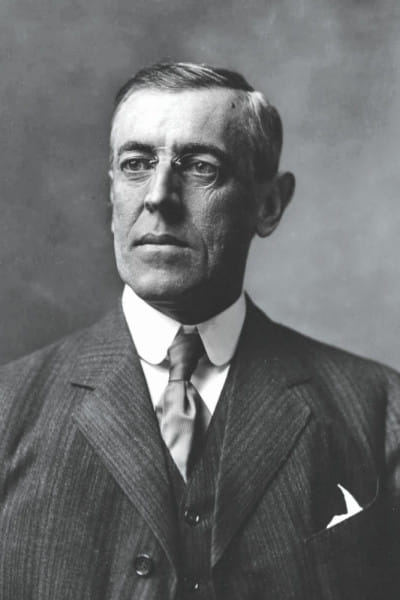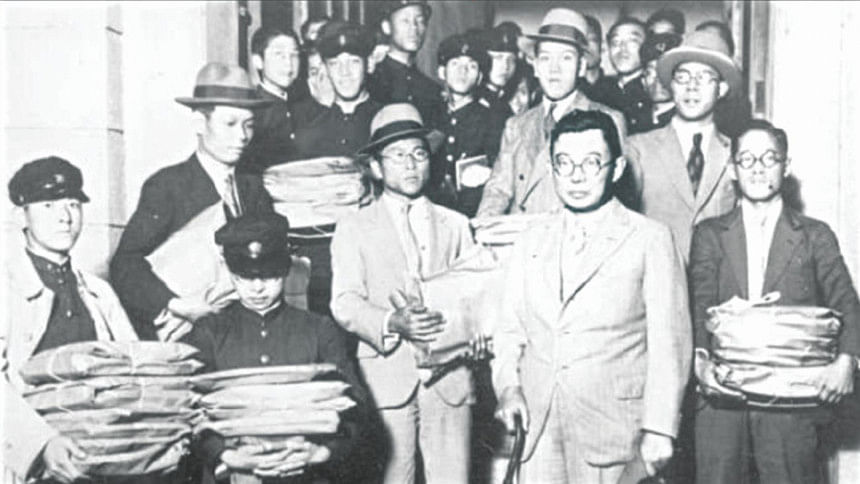Racists do stupid things that ruin the world

Racism is far from dead, but we have come a long way. Plenty still living remember when racial discrimination wasn't an illicit practice but explicit state policy; today apartheid is practiced only in a rare few countries, and subtly at that. Equal treatment of humans regardless of race is after all guaranteed in the Universal Declaration of Human Rights. That's a United Nations document, and clearly its inclusion was another acknowledgement of the many failures of that organisation's predecessor, the League of Nations.
The League of Nations was the first stab at an international community of governments working to preserve world peace – its charter was drafted at the Paris Peace Conference in 1919 at the end of "The War to End All Wars". Though he didn't coin the phrase, US President Woodrow Wilson used it to describe World War I, which had left Europe shattered. The United States were the war's real winners – its isolationist policies leading it to enter late and emerge unscathed, while making profits on loans and supply sales to its allies. Wilson provided the driving force for the League's formation at the peace talks, recognising America's new power and the responsibility it had to the rest of the world.
There is ultimately much irony in Wilson's idealism but it was dealt an early blow by Japan's innocuous request that a racial equality clause be added to the League's charter: "The equality of nations being a basic principle of the League of Nations, the High Contracting Parties agree to accord as soon as possible to all alien nationals of states, members of the League, equal and just treatment in every respect making no distinction, either in law or in fact, on account of their race or nationality."

Unfamiliar language to modern eyes but arguing for principles we take for granted, it was ultimately vetoed from inclusion in the Covenant of the League of Nations.
Japan was another prominent winner of WWI, capturing German territories in the Pacific while fighting as Britain's ally. By 1919 it could go toe-to-toe with many white, European powers, the first modern Asian state to achieve this; the racial equality clause would merely be a formal acknowledgement of this fact. It was not intended as a high-minded call for universal social justice – Japan was resolutely inward-oriented and had little interest in the plight of peoples abroad and itself practiced racial discrimination at home against the Chinese – but as an assurance that Japan would not be racially discriminated against in the League.
However the language of the clause easily lent itself to a universalist interpretation which was a problem, given the participants at the Paris Peace Conference. Of the 19 delegates at the conference, 17 were present to vote on the clause. The two absent delegates were Belgian (which will not surprise readers of this column). Eleven delegates voted for its inclusion, of whom only France and Italy were colonial powers. None of the other six delegates voted against it – these included the US and UK delegates.
Despite the clear majority, President Wilson overturned the vote, explaining that strong opposition to the clause made a unanimous vote necessary.
What happened? In a word: Australia.
Australia's prime minister Billy Hughes was a combative man keen to preserve the White Australia policy which restricted Asian immigration Down Under. He framed the policy as crucial to Australian nationalism, which he banked on to secure electoral votes at home, and refused to concede on it. Hughes was particularly bent on opposing the Japanese, whose successes in the Pacific made them a bogeyman for jingoist Australians. He summed up his stance in his personal notes: "[The clause] may be all right. But sooner than agree I would rather walk into the Seine… with my clothes off." The river Seine at that period was a glorified sewer.
Hughes' grandstanding, uncompromising stance forced the UK to support its dominion and exert pressure to halt the racial equality clause from passing. President Wilson was determined that the League function, which it couldn't without the UK, and didn't mind the price of compromise on promising ideals. His decision to overturn the racial equality clause was arguably made easier by his country's own problems with race: Asian immigration to California was as much a national scare in the US as in Australia, and Wilson's own power base lay in the racist South.
There were consequences. Japan was offended at being snubbed by the white powers and it grew hostile in its relations with the Anglo-American world. Liberals in the Japanese government lost ground to the sort of imperialists Australia had been afraid of in the first place and though it remained in the League for some years it disregarded the League's condemnation of its future actions against the Chinese in Manchuria. This was one of the nails in the League's coffin – but the first international union of nations was doomed in its infancy.
President Wilson, who offended Japan and thereby unwittingly precipitated World War II in his determination that all the major powers stay on in the League of Nations, failed to convince his own Senate that the USA should join. The fate of the world rests on such little ironies.
References
Universal Declaration of Human Rights, Article 2.
Takahara, S., Dr. (2003, March 17). Wilsonian Idealism and Its Impact on Japan: The Case of Japan's Racial Equality Proposal. Retrieved from http://www.asjapan.org/web.php/lectures/2003/03
Suich, M. (2012, June 23). Diplomacy that led to human catastrophe. The Australian.
Lewis, A. S. (2015, December 18). Wilson and the Racial Equality Clause. Retrieved from https://www.guernicamag.com/daily/andrew-s-lewis-wilson-and-the-racial-equality-clause/
Shimazu, N. (1995). The racial equality proposal at the 1919 Paris Peace Conference: Japanese motivations and Anglo-American responses (Unpublished master's thesis). University of Oxford, Magdalen College.
Shimazu later wrote a book on this topic, but I do not possess a copy.
Zoheb Mashiur is a prematurely balding man with bad facial hair and so does his best to avoid people. Ruin his efforts by writing to [email protected]

 For all latest news, follow The Daily Star's Google News channel.
For all latest news, follow The Daily Star's Google News channel. 



Comments